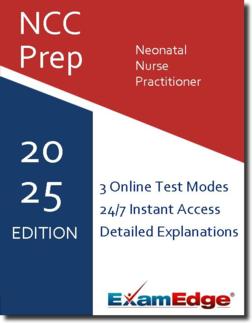NCC Neonatal Nurse Practitioner (NNP) Practice Tests & Test Prep by Exam Edge - Test Reviews
Based on 17 Reviews
- Real Exam Simulation: Timed questions and matching content build comfort for your NCC Neonatal Nurse Practitioner test day.
- Instant, 24/7 Access: Web-based NCC Neonatal Nurse Practitioner practice exams with no software needed.
- Clear Explanations: Step-by-step answers and explanations for your NCC exam to strengthen understanding.
- Boosted Confidence: Reduces anxiety and improves test-taking skills to ace your NCC Neonatal Nurse Practitioner (NNP).

NCC Neonatal Nurse Practitioner (NNP) Practice Tests & Test Prep by Exam Edge - Review
NCC Neonatal Nurse Practitioner - Reviews
Excellent
Based on
85
reviews
“ Lots of repeat questions. Questions were too simple. Did not prepare me for my certification exam.
Rebecca , Charleston, South Carolina
“ Inpatient OB. I passed!
Melinda , Yukon, Oklahoma
“ Would have been nice to get quicker response regarding the fact I still had a couple of tests left instead of needing to buy more!
Stephanie , Wolcottville, Indiana
See why our users from 154 countries love us for their exam prep! Including 17 reviews for the NCC Neonatal Nurse Practitioner exam.
Exam Edge is an Industry Leader in Online Test Prep. We work with our Institutional Partners to offer a wide array of practice tests that will help you prepare for your big exam. No Matter how niche field of interest might be, were here to help you prepare for your test day.
| 2.8M | 4.5M | |
| Users | Tests Taken | |
| 100K | 19 | |
| Unique Exams | Years in Business | |


